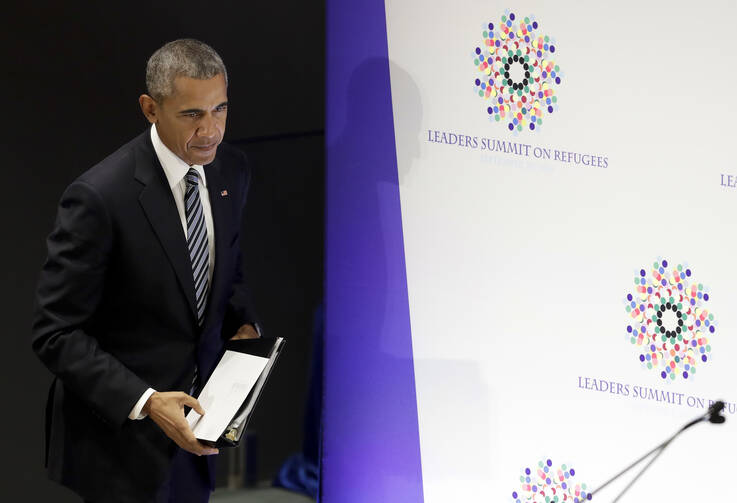Frustrated after years of fraught diplomacy, President Barack Obama will seek Wednesday to cast the U.S. partnership with Israel as on solid footing, even as he openly weighs using the final stretch of his presidency to ramp up pressure on Prime Minister Benjamin Netanyahu to finally make peace with the Palestinians.
Obama's meeting Wednesday with Netanyahu will likely be his last before leaving office, the White House said. For both leaders, it's a capstone to a relationship that has been testy at best.
Ties between the two leaders never fully recovered after Netanyahu showed up on Capitol Hill to lobby Congress against Obama's nuclear deal with Iran. The Obama administration, meanwhile, has been dismayed by periodic comments by the Israeli leader suggesting he's less-than-serious about the two-state solution that has been the basis of all serious peace efforts for decades.
This time, at least, the leaders have a concrete achievement to showcase as evidence that America and its closest Mideast ally are sticking together: A 10-year military assistance deal worth $38 billion, the largest tranche of military aid the U.S. has ever given another country. The White House is hoping the unprecedented aid will curb the perception among Israel's supporters that Obama has been insufficiently supportive of the Jewish state.
Iran's chief of staff of the armed forces said Wednesday the U.S.-Israeli aid deal makes Iran more determined to strengthen its military.
Netanyahu said shortly before heading to the U.S. for the annual U.N. General Assembly that he planned to thank Obama "for the great and important security assistance to the State of Israel over the coming decade."
Yet that point of agreement, reached after arduous negotiations, only partially masks the underlying tensions between the two governments â most notably over Israel's posture toward the Palestinians and continued expansion of settlements in occupied territories.
Despite Obama's protestations, since he took office Israel has pushed a wave of construction that matched or even exceeded the pace of building when George W. Bush was president, according to Israeli government data obtained by The Associated Press.
"We've been concerned about continued settlement activity, the potential viability of a Palestinian state in the face of that settlement activity. We've raised those directly with the Israeli government," Ben Rhodes, Obama's deputy national security adviser, said Tuesday. "I'm sure President Obama will do so tomorrow as well."
Previous efforts to broker Israeli-Palestinian peace have left a bad taste for the Obama administration, most notably a frenetic attempt by Secretary of State John Kerry that collapsed in 2014. Reluctant to invest more diplomatic resources at a time when he says both sides lack the needed political will, Obama has long since conceded that his administration won't be the one to forge a resolution to the Mideast conflict.
Yet that has not stopped the president from publicly flirting with the possibility that, in his final months in office, he'll seek to influence the future debate by laying out what he sees as the contours of any viable deal. That could come in the form of a major speech or a U.S.-backed U.N. Security Council resolution â both moves that would increase pressure on Israel and that Netanyahu would be expected to oppose.
"I wouldn't rule out the president taking any particular step," Rhodes said.
Netanyahu heads to New York at a time of renewed violence back home. Responding to a series of stabbings by Palestinian assailants, Israeli forces have killed six alleged attackers just since the weekend. The bloodshed has raised fears that a year-old wave of violence could be heating up again after appearing to quiet down in recent months.
Netanyahu will likely try to portray his country as a victim in a global war against Islamic extremism. Israel has blamed the violence on what it says is incitement by Palestinian leaders â a claim the Palestinians reject.
Yet the Israeli leader may have a tough sell. The U.N., dominated by developing countries, has traditionally sympathized with the Palestinians, and even Israel's closest allies have largely blamed Netanyahu for the standstill in peace efforts.
___
Associated Press writer Josef Federman in Jerusalem contributed to this report.
Copyright 2016 The Associated Press. All rights reserved. This material may not be published, broadcast, rewritten or redistributed.







